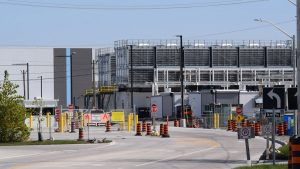A proposed new wave of green technology projects that could soon be launched across Canada is being called a game-changer for unionized ICI construction workers.
But executive director Sean Strickland says the building trades will have to be vigilant to protect their hard-won rights including prevailing-wage requirements contained in enabling legislation.
Strickland says his organization leaned on the federal government to require owners and contractors of upcoming clean technology, hydrogen and carbon-capture and storage (CCUS) projects to pay the prevailing union wage to workers building the plants.
What has emerged is a complicated approvals system in which proposed projects have to be validated by Natural Resources Canada (NRCan) and the contractual arrangements need to be vetted by Canada Revenue Agency (CRA) to ensure they meet the prescriptions of Bill C-59, which was passed in June 2024.
Under C-59, large owners of construction projects who build hydrogen, small modular reactors, carbon sequestration, solar, wind and other projects are eligible to receive a tax credit of between 15 and 40 per cent.
‘Monumental win’
“We said, if the Canadian government is going to foreclose that amount of money of Canadian taxpayers’ money, they better damn well make sure it’s tied to good-paying union jobs,” Strickland said in a presentation to members of the Ontario Building Trades at their convention recently. “They agreed, and they listened. And they said that, in order for you, owners of these projects, to get this investment tax credit, you have to pay the prevailing wage.”
The government was convinced to define the prevailing wage not as it is in U.S. legislation, which cites an average or median U.S. wage, Strickland said.
“No, the prevailing wage for these jobs is our collective agreements, the full package, health and welfare, pension, industry funds, training funds.
“This is a monumental win for our members right across the country.”
The government originally proposed the investment tax credit in its April 2023 federal budget. Strickland explained it was the Justin Trudeau government’s response to the Joe Biden administration’s Inflation Reduction Act, which contained billions in green energy and similar incentives.
The foresees $93 billion in federal incentives by 2034–35.
Projects currently eligible for the investment tax credits are air and ground source heat pumps, geothermal power, battery storage, small modular reactors, wind, solar, hydroelectric and CCUS. Coming in 2025 are large-scale nuclear and CCUS natural gas power plants, if legislation is approved this fall.
Specifically, Strickland said, the pipeline potentially includes multiple hydrogen projects in Atlantic Canada and Alberta; small modular reactor projects in Atlantic Canada, Ontario, Alberta and Saskatchewan; large-scale nuclear in Ontario; clean tech manufacturing and mining projects in Quebec; CCUS projects in British Columbia, Alberta and Saskatchewan; LNG Phase 2 in Kitimat, B.C.; solar supply chain projects in Manitoba; and EV battery plants and supply chain in Ontario and Quebec.
Significant incentive
The CBTU is aware of “five or six” projects that have been designated as investment tax credit projects so far, Strickland said.
The incentive is significant, he said.
“A 40-per-cent tax credit for hydrogen project, on a billion-dollar project, that’s $400 million.”
Strickland said the CBTU is working with NRCan to make sure it has a line of sight on the pipeline of projects. It is a system with partners – NRCan, the CRA – that has never before been attempted in Canada, he said.
“This is where we come in,” he explained. “We have to make sure that this designated investment tax credit project, that the prevailing wage is posted and the prevailing wage is paid. So we’re going to have to do our work with boots on the ground when we go to these different jobs.”
There are also apprenticeship requirements – 10 per cent of the work hours on the project must be done by apprentices.
The CBTU has established new administrative resources to handle information flow needs and urged provincial building trades councils and locals to similarly prepare for outreach or offer webinars.
“Our office is already getting calls,” said Strickland.
“It’s very exciting times, but we have to make sure that we inform our members of the building trades and inform the industry in general how it works and how we can make it as successful as possible.”
Follow the author on X/Twitter @DonWall_DCN.







Recent Comments